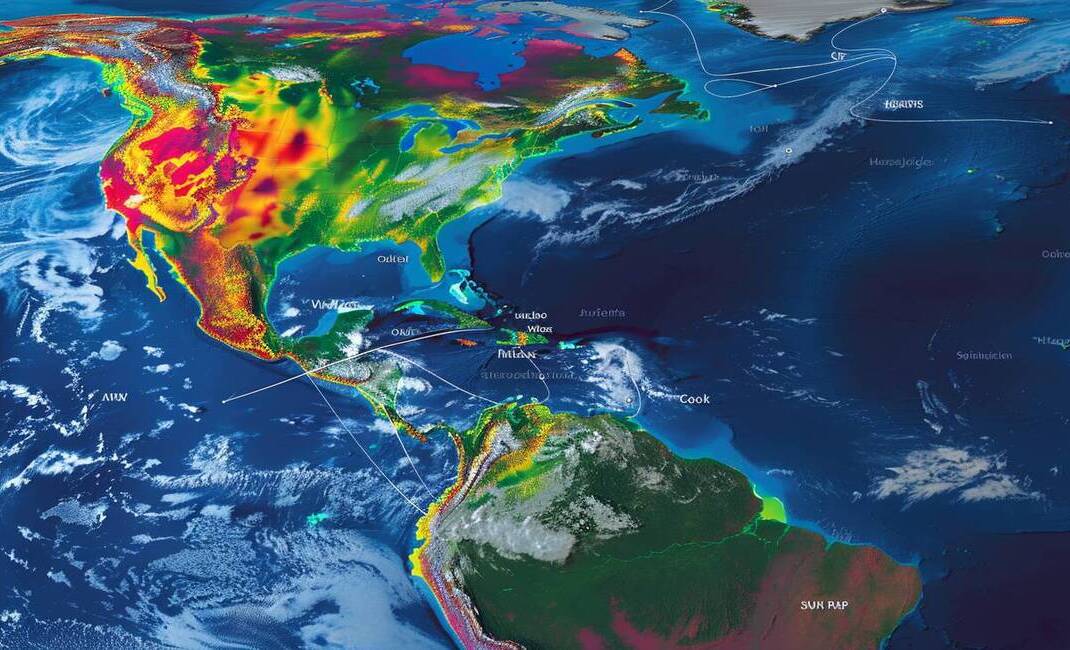Imagine waking up in a world without natural gas. No warmth in your home, no power for your favorite apps, and no fuel for countless industries that drive the global economy. For most, the intricate journey of natural gas remains invisible. Enter the Jodi Gas Manual, a comprehensive resource unveiled by the Joint Organizations Data Initiative, aimed at shedding light on this essential element of our daily lives and economies.
The Importance of Transparency in Energy Markets
Transparency in energy markets is not just a buzzword; it is a vital component for stability and trust. The Jodi Gas Manual plays a significant role in promoting this transparency. Developed by the Joint Organizations Data Initiative (JODI) in 2009, the manual aims to inform both consumers and producers about natural gas data. It is crucial for smoothing out price fluctuations and ensuring that investors feel secure in their decisions.
Role of the Jodi Gas Manual in Promoting Market Transparency
The Jodi Gas Manual serves as a comprehensive guide for understanding the complexities of the natural gas industry. It details the entire life cycle of natural gas, from production to consumption. By providing clear definitions and guidelines, the manual helps to eliminate confusion in the market. This clarity is essential for fostering a transparent environment where all stakeholders can operate effectively.
- Production: The manual defines production strictly as marketable gas, excluding flared or reinjected gas.
- Imports and Exports: It categorizes the flow of natural gas across borders, ensuring clarity between LNG and pipeline gas.
- Stocks: It emphasizes the importance of strategic reserves for energy security.
How Transparent Data Fosters Investor Confidence
When data is transparent, investors can make informed decisions. They need to know that the information they rely on is accurate and reliable. This is where the Jodi Gas Manual shines. It emphasizes the need for rigorous data collection techniques, such as balance checks and statistical differentiation. These methods ensure that the data reported is trustworthy.
"Transparency is the foundation upon which trust and investment are built in any energy market."
With reliable data, investors can assess risks and opportunities more effectively. This fosters a sense of confidence that is essential for attracting investment in the energy sector.
Impact of Data Integrity on Global Energy Relations
Data integrity is crucial not just for individual markets but also for global energy relations. Countries that maintain high standards of data integrity can enhance their credibility on the international stage. This credibility can lead to better trade agreements and partnerships. For example, Azerbaijan has established a legal framework to ensure statistical accuracy, which has improved its standing in global energy discussions.
The Evolution of Transparency from Oil to Natural Gas
The shift from oil to natural gas has transformed investment strategies. In the early 2000s, the focus was primarily on oil. However, as the importance of natural gas has grown, so has the need for transparency in this sector. The Jodi Gas Manual reflects this evolution by addressing the unique aspects of natural gas, such as its diverse sources, including shale gas and coal bed methane.
Case Studies of Countries Benefiting from Transparency
Several countries have successfully implemented the principles outlined in the Jodi Gas Manual. For instance:
- Brazil: Employs tailored strategies to navigate its complex natural gas sector.
- Thailand: Uses a collaborative model to ensure timely and accurate data reporting.
- UK: The Petroleum Production Reporting System acts as an efficient means of data collection.
These case studies illustrate that transparency is not merely an ideal; it is a practical approach that leads to tangible benefits in the energy sector.
In summary, the Jodi Gas Manual is a vital resource for promoting transparency in energy markets. By ensuring that data is accurate and accessible, it helps to foster investor confidence and strengthen global energy relations. As the energy landscape continues to evolve, the importance of transparency will only grow, paving the way for a more stable and secure energy future.
 Natural Gas Lifecycle" />
Natural Gas Lifecycle" />Understanding the Natural Gas Lifecycle
The lifecycle of natural gas is a complex journey that begins with production and ends with consumption. This process is vital for understanding how natural gas impacts economies and societies globally. Let’s break down the key stages of this lifecycle.
1. Production: Extraction to Marketable Gas
Natural gas production involves extracting usable gas from the earth. This gas is not just any gas; it must be marketable. What does that mean? It means the gas has to be processed and made ready for sale. The extraction process can be challenging, often requiring advanced technology and significant investment. Think of it like mining for treasure. You need the right tools to dig deep and find valuable resources.
2. Transportation Challenges in the Gas Industry
Once extracted, the next hurdle is transportation. Moving natural gas from production sites to consumers is no easy feat. Pipelines are the most common method, but they come with their own set of challenges. For instance, building pipelines can be expensive and time-consuming. There are also regulatory hurdles to navigate. Additionally, transporting liquefied natural gas (LNG) requires specialized ships, which can be costly. This is where the industry faces a significant challenge: how to efficiently and safely transport gas across vast distances.
3. Storage Solutions and Their Importance
Storage is another critical component of the natural gas lifecycle. Why is storage so important? It allows for a buffer between supply and demand. Natural gas cannot be easily stored like other fuels. It requires specific facilities, such as underground caverns or tanks, to keep it safe and usable. These storage solutions help ensure that there is enough gas during peak demand times, such as winter months when heating needs spike. Without effective storage, the entire supply chain could be disrupted.
4. Consumption Patterns: Domestic vs Industrial
Consumption patterns vary widely. In homes, natural gas is often used for heating and cooking. In contrast, industries use gas for power generation and manufacturing processes. This difference in usage highlights the diverse roles natural gas plays in daily life. For example, a household may rely on natural gas for warmth, while a factory might depend on it to run machinery. Understanding these patterns is crucial for predicting market trends.
5. The Distinction Between Associated and Non-Associated Gas
Not all natural gas is created equal. There are two main types: associated and non-associated gas. Associated gas is found alongside oil deposits. It’s often a byproduct of oil extraction. Non-associated gas, on the other hand, is found independently. This distinction is essential because it affects how gas is produced and marketed. Countries rich in associated gas may have different geopolitical dynamics compared to those with non-associated gas reserves.
Understanding the natural gas lifecycle is not just about the gas itself. It also sheds light on market dynamics and geopolitical stability. Various gas types influence international relations, making this topic crucial for anyone interested in energy markets. The journey of natural gas, from extraction to consumption, highlights its importance in everyday life. It powers homes and industries, shaping economies and influencing global politics.
As the world continues to evolve, so does the natural gas industry. The Jodi Gas Manual emphasizes the need for transparency in this sector. By understanding the lifecycle of natural gas, stakeholders can make informed decisions that impact energy security and economic stability.

The Role of Liquefied Natural Gas (LNG)
Liquefied Natural Gas (LNG) is transforming the energy landscape. But what exactly is LNG? It's natural gas that has been cooled to a liquid state, reducing its volume by a staggering 1:600. This means that a large amount of natural gas can be transported easily and efficiently. Let's explore the various aspects of LNG and its significance in today's world.
1. Conversion Process of Natural Gas to LNG
The conversion process of natural gas to LNG involves several steps. First, natural gas is extracted from underground reservoirs. This gas is primarily methane, but it also contains other components like ethane and propane. Next, the gas is purified to remove impurities, such as water and carbon dioxide. After purification, the gas is cooled to about -162 degrees Celsius (-260 degrees Fahrenheit). At this temperature, it becomes a liquid.
This liquefaction process is crucial. It allows for the efficient transport of natural gas over long distances. Imagine trying to move a large balloon filled with air. It’s cumbersome. Now, think of that same balloon shrunk down to the size of a marble. Much easier to transport, right? That’s what LNG does for natural gas.
2. Benefits of LNG for International Trade
LNG plays a vital role in international trade. Here are some key benefits:
- Flexibility: LNG can be shipped to various locations, making it easier for countries to access energy.
- Energy Security: Countries can diversify their energy supply routes, reducing reliance on a single source.
- Market Access: LNG opens up new markets for natural gas, allowing producers to reach consumers worldwide.
With these benefits, LNG is becoming a preferred choice for many nations. It helps them secure energy supplies and stabilize prices in the global market.
3. Impact of LNG on Geopolitical Tensions
The rise of LNG has significant implications for geopolitical dynamics. Countries that were once dependent on pipeline gas from a single supplier can now explore alternative routes. This diversification can reduce tensions. For example, nations in Europe are increasingly turning to LNG to lessen their reliance on Russian gas. This shift not only enhances energy security but also alters the balance of power in international relations.
So, how does this affect global politics? By reducing dependency on specific countries, nations can negotiate better terms and foster more stable relationships. LNG is not just an energy source; it’s a tool for diplomacy.
4. Comparison with Traditional Pipeline Methods
When comparing LNG to traditional pipeline methods, several differences emerge:
- Transport Efficiency: LNG can be transported across oceans, while pipelines are limited to land routes.
- Infrastructure Costs: Building pipelines can be expensive and time-consuming, whereas LNG terminals can be established more quickly.
- Market Adaptability: LNG allows for more flexible trading, as it can be redirected to different markets based on demand.
This flexibility makes LNG a more attractive option for many countries, especially those with limited pipeline access.
5. Investment Opportunities in LNG Infrastructure
The LNG sector is ripe with investment opportunities. As demand for cleaner energy sources grows, investing in LNG infrastructure is becoming increasingly appealing. Here are some areas to consider:
- Liquefaction Facilities: Building new liquefaction plants can enhance production capabilities.
- Regasification Terminals: These facilities are essential for converting LNG back into gas for consumption.
- Transportation Vessels: Investing in LNG carriers can facilitate global trade.
With the increasing importance of LNG in the global energy market, these investments can yield significant returns.
In summary, LNG is not just a fuel; it’s a game-changer in the energy sector. Its ability to reduce volume, enhance trade, and influence geopolitics makes it a pivotal player in the future of energy. As countries continue to embrace LNG, the landscape of global energy will undoubtedly evolve.

Critical Aspects of Data Collection and Reporting
In the world of natural gas, accuracy in data collection is not just important; it is essential. Why? Because accurate data collection prevents market manipulation. If data is flawed, it can lead to misguided decisions that affect economies and energy supplies. This is why transparency in data is crucial. It helps market players predict shifts and make informed decisions.
The Importance of Accuracy in Gas Data
Gas data serves as the backbone of the energy market. Think of it like a map for travelers. Without accurate maps, travelers can easily get lost. Similarly, without accurate gas data, stakeholders may struggle to navigate market dynamics. For instance, if a country reports inflated gas production figures, it could mislead investors and distort market prices. This is why accuracy is paramount.
Techniques for Ensuring Data Integrity
To maintain data integrity, several techniques can be employed:
- Checks and Balances: Regular audits of data collection processes help identify discrepancies.
- Statistical Differentiation: By comparing various data sets, analysts can spot inconsistencies.
- Time Series Analysis: This method allows for the examination of data over time, revealing trends and anomalies.
These techniques are vital for ensuring that the data reported is reliable. They act as safeguards against errors that could lead to significant financial consequences.
How Gross Inland Deliveries Are Calculated
Gross inland deliveries encompass all natural gas consumption within a country. This includes everything from heating homes to fueling power plants. The calculation involves several steps:
- Gather data on production levels.
- Account for imports and exports.
- Subtract any gas that is reinjected or flared.
This meticulous process ensures that the reported figures accurately reflect actual consumption. It’s like piecing together a puzzle; every piece must fit perfectly to reveal the complete picture.
Seasonal Trends Impact on Natural Gas Consumption
Natural gas consumption is not static; it fluctuates with the seasons. In winter, demand typically spikes as people heat their homes. Conversely, summer months may see a decline in usage. Understanding these seasonal trends is crucial for accurate forecasting. For example, if a country underestimates winter demand, it could face supply shortages. This is why data analysts must consider seasonal variations when reporting.
Regulatory Frameworks Improving Data Quality
Governments play a critical role in ensuring robust data reporting systems. Regulatory frameworks help enforce standards for data collection and reporting. Countries like Azerbaijan have established legal frameworks to govern statistical accuracy, while Brazil uses tailored strategies to navigate its complex gas sector. These frameworks not only improve data quality but also enhance investor confidence.
Moreover, the Jodi Gas Manual emphasizes the importance of transparency in data management. It serves as a guide for countries to enhance their data accuracy. By following these guidelines, nations can better navigate the complexities of the natural gas market.
In summary, accurate data collection is pivotal for informed decision-making. The techniques outlined above help enhance reliability, ensuring that stakeholders can trust the information they receive. This trust is essential for maintaining stability in the energy market.

Case Studies of Successful Data Implementation
Data management in the natural gas sector is not just a technical necessity; it is a lifeline for nations. Countries around the world have adopted various frameworks to enhance their data reporting and management practices. These case studies highlight how different nations have approached the challenges of gas data reporting.
Azerbaijan's Statistical Accuracy Framework
Azerbaijan has established a robust framework for statistical accuracy. This framework is supported by a legal structure that mandates precise data collection and reporting. The government emphasizes the importance of accurate statistics in promoting transparency and accountability.
- Legal Framework: Azerbaijan's laws ensure that data is collected systematically.
- Training Programs: Continuous training for data collectors enhances the quality of information.
By focusing on these aspects, Azerbaijan has improved its statistical accuracy significantly. This commitment to data integrity is essential for attracting foreign investment and boosting economic stability.
Brazil's Tailored Strategies for the Natural Gas Sector
Brazil presents a different scenario. The country has tailored its strategies to address the unique challenges of its natural gas sector. With a diverse energy portfolio, Brazil focuses on integrating various energy sources.
- Sector-Specific Approaches: Brazil's strategies are designed to fit the complexities of its energy landscape.
- Stakeholder Engagement: Involving local communities and industries in the data collection process ensures more comprehensive insights.
This tailored approach allows Brazil to navigate its complex energy dynamics effectively. The country’s strategies serve as a model for others facing similar challenges.
Thailand's Collaborative Approach to Data Sharing
Thailand stands out with its collaborative model for data sharing. The government actively fosters communication among various stakeholders, including government agencies, private companies, and academic institutions.
- Inter-Agency Collaboration: Regular meetings and workshops enhance cooperation.
- Data Accessibility: Making data available to all stakeholders improves transparency.
This collaborative approach has resulted in timely and accurate data reporting, which is crucial for effective decision-making. Thailand’s model emphasizes that collaboration can lead to better outcomes in data management.
UK's Petroleum Production Reporting System
The United Kingdom has implemented a robust Petroleum Production Reporting System. This system is designed to streamline data collection and improve reporting methodologies.
- Efficiency: The UK system reduces redundancy in data reporting.
- Continuous Improvement: Regular updates to the system ensure it remains effective and relevant.
By focusing on efficiency and continuous improvement, the UK has set a standard for other countries to follow. This system not only enhances data accuracy but also supports better policy-making.
Lessons Learned from Each Country's Efforts
Each of these countries has faced unique challenges in gas data reporting. However, they share common lessons that can benefit others:
- Importance of Accuracy: Accurate data is essential for effective policy-making.
- Stakeholder Collaboration: Engaging all relevant parties leads to better data quality.
- Continuous Training: Ongoing education for data collectors enhances the reliability of information.
These lessons underscore the need for a structured approach to data management. Countries can learn from each other’s successes and challenges, fostering a global environment of improved practices.
In summary, the case studies from Azerbaijan, Brazil, Thailand, and the UK illustrate diverse approaches to managing and reporting natural gas data effectively. Each country’s experience offers valuable insights into best practices that can be adopted worldwide.

The Future of Natural Gas and Data Management
The natural gas market is evolving rapidly. As global energy demands shift, understanding these changes becomes crucial. What trends are shaping the future of natural gas? How will data management play a role in this transition? Let’s explore these questions.
Trends in Global Natural Gas Markets
Natural gas is becoming a cornerstone of the global energy landscape. With the push for cleaner energy sources, many countries are turning to natural gas as a bridge fuel. This shift is driven by several factors:
- Environmental Concerns: Natural gas emits less carbon dioxide than coal and oil, making it a more attractive option for reducing greenhouse gas emissions.
- Economic Factors: The abundance of shale gas has lowered prices, making natural gas more accessible.
- Technological Advancements: Innovations in extraction and transportation have made it easier to tap into natural gas reserves.
As demand for cleaner energy grows, the global natural gas market is projected to expand significantly. This growth will require effective data management to track production, consumption, and pricing trends.
Projected Energy Transitions and Their Impact
The energy transition is not just about moving away from fossil fuels. It’s about integrating renewable energy sources with existing systems. Natural gas plays a vital role in this mix. It can provide backup power when renewable sources like wind and solar are not available. But how will this impact the market?
Experts predict that by 2030, global gas demand will continue to rise. This increase will depend on how quickly countries adopt renewable technologies and the policies they implement. The transition will also influence pricing, supply chains, and international relations.
Innovative Technologies in Gas Production and Data Collection
Innovation is key to the future of natural gas. New technologies are emerging that enhance production efficiency and improve data collection. For instance, advanced sensors and data analytics can monitor gas flows and identify leaks in real-time. This not only boosts production but also enhances safety.
Moreover, the Jodi Gas Manual emphasizes the importance of transparency in data management. By improving data accuracy, countries can make better decisions regarding their energy policies and investments. This is essential for both producers and consumers.
The Role of Policy in Shaping the Future Landscape
Policies will play a significant role in determining the future of natural gas. Governments must create frameworks that support sustainable practices while ensuring energy security. This includes:
- Regulatory Frameworks: Clear regulations can help guide investments in natural gas infrastructure.
- Incentives for Innovation: Encouraging research and development in gas technologies can lead to more efficient production methods.
- International Agreements: Cooperation between nations can enhance energy security and stabilize markets.
As policies evolve, they will directly influence market dynamics. Countries that adapt quickly will likely gain a competitive edge.
Enhancing International Cooperation for Energy Security
Energy security is a global concern. Countries must work together to ensure a stable supply of natural gas. This cooperation can take many forms, such as:
- Joint Ventures: Collaborative projects can lead to shared resources and expertise.
- Data Sharing: Countries can benefit from sharing data on production and consumption patterns.
- Emergency Response Plans: Having coordinated strategies for supply disruptions can enhance resilience.
In an interconnected world, the future of natural gas depends on international collaboration. By working together, nations can navigate the complexities of the energy landscape.
In conclusion, the future of natural gas is intertwined with effective data management and cooperative governance. As the market evolves, understanding these dynamics will be essential. The journey ahead will require innovation, adaptability, and a commitment to transparency. With the right strategies in place, natural gas can continue to play a pivotal role in the global energy transition, ensuring a sustainable and secure energy future.
TL;DR: The Jodi Gas Manual is essential for understanding the lifecycle of natural gas and promoting transparency in energy markets. Its comprehensive data management practices aid countries in enhancing energy security and economic stability.

Comments
Post a Comment